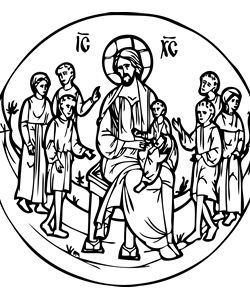|
|||
|---|---|---|---|
| This weekly bulletin insert complements the curriculum published by the Department of Christian Education of the Orthodox Church in America. This and many other Christian Education resources are available at http://dce.oca.org. | |||

We read in Matthew 21: 23-27 that Jesus confounded the chief priests and elders by asking them a question they could not answer, about baptism and authority. Baptism was an important issue for them, and for Our Lord. Saint Andrew Stratelates, as an adult, sought baptism even though he knew it would lead to martyrdom. God chose to honor Andrew's decision by marking the place where he sacrificed his life with a healing spring.. Baptism, clearly, is central in Scripture and in the Church's history of saints. It's equally clear that the ancient Church had a view of baptism that is preserved in Orthodoxy, but not shared by some of our fellow Christians. A fundamentalist pastor has written that the water of baptism does not cleanse us. Rather, it is "a testimony to our faith in the risen Lord Jesus, a faith we must have before we go into the water of baptism." These words explain why some Christian groups do not baptize infants, as the Orthodox do. These groups teach that a person must be a believer before undergoing baptism. Babies, though in a state of innocence, are not believers; they have not made a confession of faith and repented of sin. We Orthodox agree that babies have no inherited guilt or "original sin" because of Adam's sin, though they are born into the sinful world and are influenced by it. But baptism is not just forgiveness of sins. Nor does it depend on a confession based on intellectual assent to the faith. Rather, it is entrance into the family that shares the new, eternal life given to us by Jesus Christ. That new life came about by means of Jesus Christ's death and resurrection. He had to die in order to overcome death once and for all. In baptism we unite ourselves with His death and resurrection, with the promise that "if we have been united with Him in a death like his, we shall certainly be united with Him in a resurrection like His" (Romans 6:5). It is interesting that Martin Luther not only advocated infant baptism, but insisted on immersion rather than merely sprinkling the baby. He wrote that "the child should be completely submerged and pulled out again" in order to show the true death-and-new-life meaning of the rite.
Those who object to infant baptism claim that it has no Scriptural basis. The Church's answer is that we have several examples of whole households receiving baptism in the New Testament. The "household" means everyone, including children. In Genesis 7: 1 God tells Noah: "Go into the ark, you and all your household." Nobody was left behind. That meaning of "household" continues into the New Testament, as does God's covenant. To take just one example of whole New Testament households being baptized, we can read about Lydia in Acts 16: 15. The early Church took it for granted that the water of baptism was meant for babies as well as those who intellectually "understand" the faith. We carry on the early tradition today, confident that we are doing God's will. |
|||
